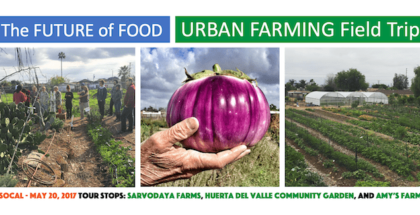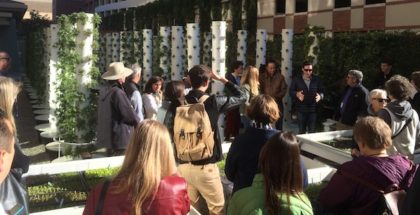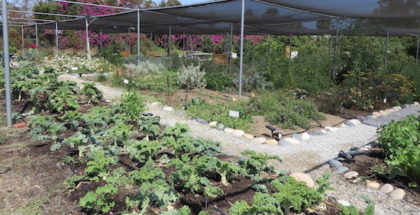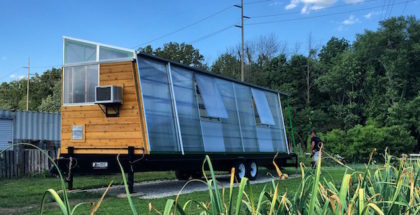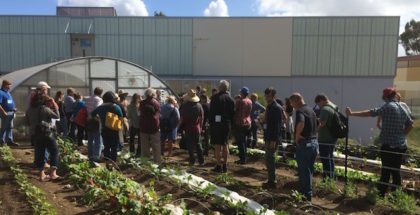Urban Agriculture
‘Future of Food’ Urban Farming Field Trip to Explore Urban Ag Endeavors in Inland SoCal
April 4, 2017 | Robert PuroSlated for Saturday, May 20, 2017 the ‘Future of Food – Urban Farming Field Trip’ will visit a series of innovative urban farming ventures in Inland Southern California that have emerged to grow the local food marketplace, increase food access, educate local communities, advocate for food equity, and improve health and nutrition. The field trip hosted by Seedstock, a social venture that seeks to foster the development of sustainable local food systems, will also include lectures from experts in urban farming.
The tour is the third in a series of Seedstock ‘Future of Food’ field trips that was recently launched to facilitate the exploration of food system innovations that are generating economic and community capital. Read More
‘Future of Food’ Field Trip Explores Commercial and Community Driven Urban Farms in Los Angeles, CA
January 30, 2017 | Robert Puro
Attendees of the Seedstock ‘Future of Food – Urban Ag Field Trip’ at USC Teaching Garden, learning about the farm’s aeroponics operations from LA Urban Farms’s Wendy Coleman and Niels Thorlaksson. Photo credit: Robert Puro, Seedstock.
On Friday, January 27, Seedstock hosted the inaugural ‘Future of Food – Urban Ag Field Trip’, which provided attendees an excursion into the diversity of urban farming and state-of-the-art hydroponic, aquaponic and aeroponic agriculture operations in Los Angeles County, the most populous county in the U.S. The sold out tour treated participants to lectures and sessions from pioneering farmers who are embracing innovative business models and growing systems to both increase food security and take advantage of the escalating demand for local food.
The tour kicked off with a stop at The USC Teaching Garden, a joint venture between L.A. Urban Farms and USC Hospitality, which utilizes aeroponic tower gardens to challenge the food systems status quo on campus. The garden was established to supply fresh produce to the university’s on-campus restaurants, dining halls, catering services, and hotel, while also teaching students and staff about flavor and sustainability. Attendees heard from Chef Eric Ernest, Executive Chef of USC Hospitality, discuss the economic viability of the garden. Chef Ernest noted that the garden is not just for show, and that its 90 aeroponic garden towers grow enough food for campus retail units to break even each year. “The garden is about connecting chef and customer,” said Chef Ernest. We also heard from L.A. Urban Farms founder Wendy Coleman, and partner Niels Thorlaksson, discuss the technical details of the farm, its water usage, and maintenance requirements. Thorlaksson explained that each aeroponic garden tower utilizes 5 – 10 gallons of water per week. Read More
SoCal Urban Farming Org Increases Supply of Fresh Produce to Homeless Shelter by Healing Soil and Residents
January 24, 2017 | Charli Engelhorn
Velva, an employee of GrowGood, a CA-based nonprofit that has been working with the Salvation Army since 2011 to develop a garden-based program for the residents of the Bell Shelter that uses healthy food and gardening as a catalyst for healing. (Photo courtesy of GrowGood. Photo credit: Amy Gordon.)
Prior to the establishment of the GrowGood urban farm on a lot across the way from the Salvation Army Bell Shelter located in Bell, CA, the shelter, which serves nearly 6,000 meals per week, incorporated very little fresh produce into its menu.
“They were spending cents per meal on fresh produce. Food was donated, so no one was going hungry; but the nutritional quality was often low,” says Brad Pregerson, co-founder of GrowGood, a CA-based nonprofit that has been working with the shelter since 2011 to develop a garden-based program to not only increase the supply of fresh produce to the shelter, but also to provide its residents with meaningful work and act as catalyst for healing.
The Salvation Army Bell Shelter, which opened in 1988, was established with help from Pregerson’s grandfather, Harry, a federal judge and veteran, who perceived the dire need to provide housing for the growing Read More
Vacant Lot Turned Urban Farm Transforms Community, Increases Food Access
January 2, 2017 | Maria Hsin
The Growing Experience (TGE) is a seven-acre urban farm in North Long Beach that is located on a previously vacant lot. Photo Credit: Maria Hsin
On a recent Friday morning, eggs, figs and other vegetables and fruits were being placed on the back of a small truck destined to be sold at a farm stand in the parking lot outside of the Senior housing block in the Carmelitos Public Housing Community in Long Beach, CA. The produce was grown on site at The Growing Experience (TGE), a seven-acre urban farm in North Long Beach that is located on a previously vacant lot that is part of the same housing complex.
The TGE urban farm is unique in that it is owned and operated by the Housing Authority of the County of Los Angeles (HACoLA), which manages 3,229 units of public and other affordable housing for the county’s Public Housing program. Read More
‘Insurgent Architecture’ Students Build Mobile Greenhouse to Overcome Urban Farming Challenges
December 19, 2016 | Karen BrinerIt is believed to be a world first: a fully functioning greenhouse on wheels that plugs in much like an RV and that could offer up solutions to some of urban farming’s biggest challenges. The mobile greenhouse prototype, which goes by the name GrOwING GREEN, was born of a collaboration between architecture students at Ball State University and Butler University’s Center for Urban Ecology (CUE). It has already been recognized by the American Institute of Architects with a state award for excellence in architecture.
Timothy Gray, a professor of Architecture at Ball State, whose fourth year students designed and constructed the mobile greenhouse, points out that the mobility aspect opens up a world of possibilities, including the idea of bringing the farm to the people. As stated on their website, the prototype, “lends itself to the shifting and temporal nature of the urban farm.” Read More
Urban Ag Field Trip to Explore Innovative Farming Operations in L.A. County
December 15, 2016 | Robert PuroUrban agriculture ventures of all different stripes – from commercial hydroponic enterprises and rooftop aeroponic farms to community gardens planted atop formerly vacant lots – are not only disrupting the food system, but also generating community and economic capital.
To give you an up close and personal look at a series of innovative urban farming operations that have emerged to tackle challenges to food access, meet marketplace demand for local food, and increase food security, Seedstock has put together the ‘Future of Food – Urban Ag Field Trip’.

Slated for Friday, January 27, 2017, the field trip will look at the community and economic development potential of urban farming. Tour stops include the USC Teaching Garden, Local Roots Farms, and The Growing Experience.
Scheduled for Friday, January 27, 2017, the field trip will look at the impact of urban farming in Los Angeles County, the most populous county in the United States, and include lectures on such topics as the past, present, and future of urban agriculture, vertical farming, and sourcing local food from urban farms. Read More
Master Gardener Program Grows Food and Community Across L.A. County
December 12, 2016 | Charli EngelhornSince University of California Cooperative Extension established the first Master Gardener Programs in the state in 1981, its army of certified volunteer gardeners, who are today spread across more than 50 counties, have supported programs aimed at educating California residents, especially those living in low-income communities, about growing their own food.
In Los Angeles, one such program that Master Gardener Program volunteers supported was the Common Ground Garden Program, which was established in 1976 with funds from a Congressional appropriations bill to support a national Urban Garden Program. Working in collaboration with the Common Ground Garden Program, the Master Gardener volunteers played a pivotal role in helping to set up several community and school gardens across the county.
After funding from the Urban Garden Program ceased, the Los Angeles County branch of the Master Gardener Program formally took over the task of training community gardeners. Read More
Urban Agriculture Incentive Program Seeks to Increase Farming Opportunities in Local Communities
December 5, 2016 | Charli EngelhornIn September 2013, California passed Assembly Bill 551 (AB551), Urban Agriculture Incentive Zones (UAIZ), which allows cities and counties within the state to incentivize land owners to donate vacant or undeveloped land for urban agriculture use over a five-year period, according to information from the Los Angeles Department of Regional Planning. Land owners who participate will receive reduced property tax assessments in exchange for this allowance.
The requirements to participate include parcels between 0.10 and 3 acres, a minimum contract of five years, complete use of the land for agriculture purposes, and no prior physical structures existing on the property. Many California communities have already passed or are in the process of approving the ordinance including San Francisco, San Diego, Long Beach, San Jose, and Sacramento; however, only a couple of contracts have been processed in those areas combined.
The ordinance has already passed through Los Angeles County, but this motion only applies to unincorporated areas. The incorporated city of Los Angeles is currently in the process of approving the ordinance, according to Iesha Siler, a policy associate for the Los Angeles Food Policy Council (LAFPC). Read More

